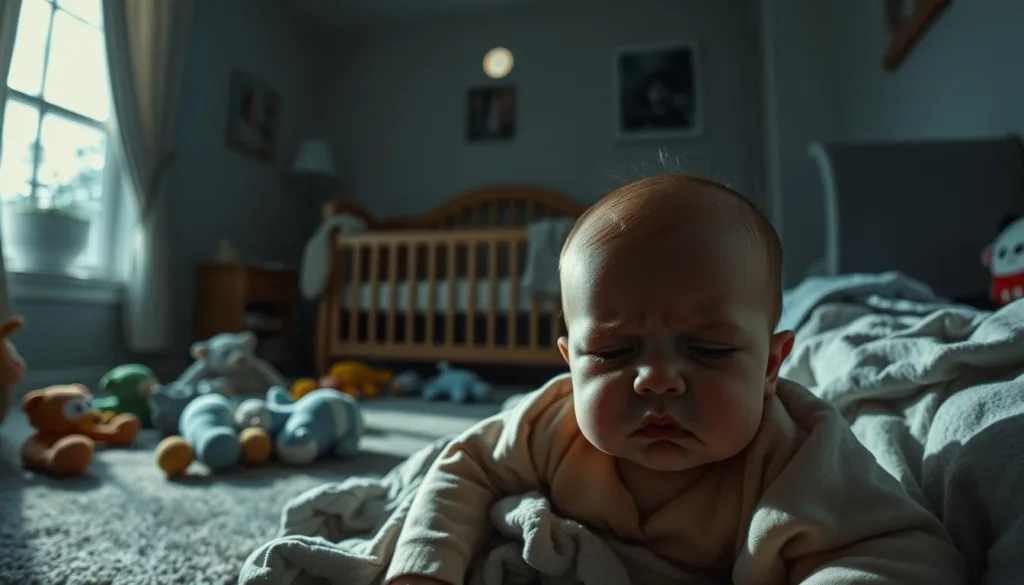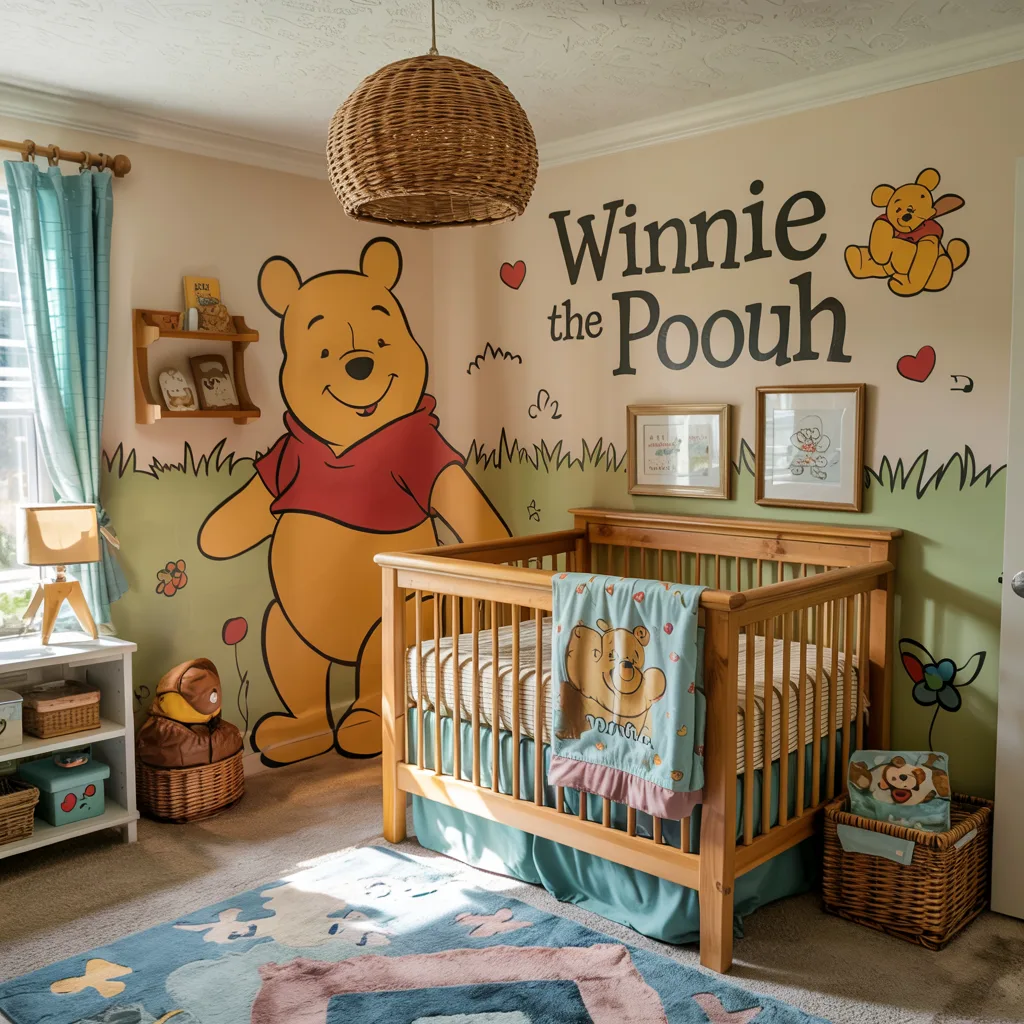Being a parent can be tough, especially when it comes to baby sleep. Overtiredness is a big problem that can mess up your baby’s sleep. It happens when a baby stays awake too long. This makes them feel stressed and can’t relax to sleep. Overtired baby sleep training can help address this issue by teaching your baby to self-soothe and settle down more easily. Don’t worry if your baby is overtired. There are ways to fix this and help them sleep better. Knowing when your baby is overtired, setting a regular sleep schedule, and using calming methods can help. These steps are key to your baby getting the sleep they need to grow well.
Key Takeaways
- Overtiredness in babies can lead to difficulty falling asleep and disrupted sleep patterns.
- Signs of overtiredness include fussiness, difficulty settling, and short naps.
- To address overtiredness, focus on creating a calm environment, following age-appropriate wake windows, and establishing consistent sleep routines.
- Effective sleep training can help your baby learn to self-soothe and sleep through the night.
- Seeking professional help may be necessary if you’re struggling to address persistent sleep issues.
Table of Contents
Understanding Overtiredness in Infants
Being a new parent means learning about your baby’s sleep patterns. Overtiredness is a common problem that affects many babies. Knowing what it is and how to spot it can help you create better sleep habits for your child.
What Does Overtired Mean for Your Baby?
Overtiredness happens when a baby stays awake too long. This makes their body release cortisol and adrenaline, stress hormones. These hormones make it hard for the baby to fall and stay asleep.
Signs Your Baby is Overtired
- Rubbing eyes or pulling ears
- Yawning excessively
- Fussiness or difficulty being soothed
- Difficulty settling down or falling asleep
- Waking up frequently during naps or nighttime sleep
Common Myths About Overtired Babies
Many think an overtired baby will sleep longer or easier. But, the truth is the opposite. Overtired babies have trouble falling and staying asleep, leading to poor sleep quality.
“Helping babies get enough daytime sleep can assist in breaking the cycle of overtiredness.”
Another myth is that controlled crying is the best way to handle overtiredness. But, experts now suggest gentler methods. These include creating a calming bedtime routine and teaching babies to soothe themselves.
It’s important to understand your baby’s sleep cues and set wake windows that fit their age. By listening to your child and sticking to a routine, you can help them smoothly move from play to sleep.

Why Sleep Training Matters for Your Child
Overtied baby sleep training is key for your baby’s growth. It boosts their brain, mood, and body. Good sleep habits mean better mood and learning skills.
Regular sleep times help your baby’s body clock. Without enough sleep, they might get cranky, have trouble focusing, and grow slower.
The Importance of Sleep for Infant Development
Quality sleep is vital for your baby’s growth. It helps their body fix itself and their brain work better. Without enough sleep, they can feel sad, have trouble thinking, and not grow as they should.
Benefits of Effective Sleep Training
Good sleep training brings many benefits. Studies show babies get better sleep in just a few days. By night three, they sleep much better.
A study with 652 families found crying drops by over 50% by night two. Sleep training is safe for both kids and parents.
How Sleep Affects Your Baby’s Mood
Well-rested babies are happier and cry less. After a few days of sleep training, they start to sleep better. Bedtime routines help them feel better and sleep better too.
Good sleep habits are crucial for your baby’s growth and happiness. By focusing on sleep, you help your child have a better childhood.

Identifying Overtired Baby Sleep Issues
As a parent, knowing when your baby is overtired is key. Overtiredness can cause many sleep problems. These include waking up a lot at night, short naps, and trouble sleeping alone.
Spotting the signs of overtiredness can help you fix sleep issues. It’s important to understand how overtiredness impacts your baby’s sleep. This knowledge lets you take steps to improve their sleep quality.
Symptoms of Overtired Sleep Problems
There are clear signs when a baby is overtired. These include:
- Frequent night wakings and trouble falling back asleep
- Short or restless naps during the day
- Hard time falling asleep at bedtime
- Being too active or fussy
- Yawning or rubbing their eyes a lot
How Overtiredness Affects Sleep Patterns
Overtiredness messes with your baby’s sleep cycles. It makes their sleep less restful. When a baby is overtired, their body makes stress hormones like cortisol and adrenaline.
These hormones make it tough for them to sleep well. This can start a cycle of poor sleep. It makes the problem worse.
By knowing the signs of overtiredness, you can help your baby sleep better. This is crucial for their health and happiness.

Strategies to Combat Overtiredness
It’s important to fight overtiredness in your baby for good sleep cycles and restful nights. A consistent sleep routine and gentle sleep coaching can help. This way, your baby can break the cycle of being overtired and sleep well.
Creating a Consistent Sleep Routine
Setting up a regular sleep routine is key to beating overtiredness in babies. Make sure nap and bedtime times are the same every day. This helps your baby’s body clock get used to sleep times.
Techniques for Soothing an Overtired Baby
Gentle ways to calm an overtired baby are very helpful. Try swaddling, white noise, rocking, or bouncing. Keep the room quiet and dark before bed for better sleep.
Environmental Adjustments for Better Sleep
The sleep environment is crucial for your baby’s rest. Make sure the nursery is dark, quiet, and cool. Use blackout curtains, sound machines, and a safe bed for the best sleep conditions.

“Consistency is key when it comes to combating overtiredness in babies. By establishing a predictable routine and creating a sleep-friendly environment, you can help your little one get the rest they need to thrive.”
Understanding Sleep Cycles in Infants
As your baby grows, it’s key to grasp their sleep patterns. Infant sleep cycles are different from adults’, with shorter times and more stage changes. Knowing these cycles helps you meet your baby’s sleep needs better.
The Basics of Infant Sleep Cycles
Newborns spend a lot of time in light sleep, moving often between active and quiet sleep. By 3-6 months, their sleep pattern becomes clearer, with longer night sleep and longer naps during the day.
Research shows that at 4 months, babies take 4 naps a day, totaling about 4 hours of sleep. By 5 months, they nap 3 times a day, for about 3.5 hours. Between 6 to 13 months, they nap 2 times a day, for about 3 hours.
How Overtiredness Affects Sleep Cycles
Overtiredness can mess up your baby’s sleep, causing more wake-ups and trouble switching sleep stages. When babies get overtired, stress hormones like cortisol make it tough for them to sleep well.
To keep sleep healthy, watch for your baby’s sleep signs and adjust their schedule. A regular bedtime routine and enough sleep during the day and night can stop overtiredness. This supports their sleep cycle growth.
Techniques for Sleep Training Overtired Babies
Dealing with an overtired baby can be tough for parents. But, there are gentle ways to help your baby sleep better. Let’s look at some effective methods to help your baby sleep well.
Gentle Sleep Training Methods
Gentle sleep training focuses on small changes and keeping parents close. These methods help soothe your baby, teaching them to fall asleep by themselves.
- Gradual Withdrawal: This method slowly increases the time you’re away from your baby’s crib. It helps them learn to fall asleep alone.
- Controlled Crying: Also known as the Ferber method, it involves checking on your baby at set times. This helps them learn to self-soothe.
- Chair Method: You start by sitting in a chair near your baby’s crib. Then, you move the chair further away as they learn to sleep alone.
Gradual vs. Immediate Sleep Training Approaches
Choosing between gradual and immediate sleep training depends on your baby’s age and your family’s needs. Gradual methods, like Gradual Withdrawal or Chair Method, are gentler. They’re better for younger or more sensitive babies. Immediate techniques, like Controlled Crying, work well for older babies who have strong sleep habits.
Establishing a Bedtime Routine
A consistent bedtime routine helps overtired babies sleep better. A routine like a bath, pajamas, reading, and singing can signal sleep time. Keep this routine every night, even on weekends, to help your baby sleep well.
Every baby is different, so finding the right sleep training method is key. With patience, consistency, and a gentle approach, you can help your baby sleep better and thrive.
Benefits of Napping for Babies
Napping is key for a healthy sleep routine in infants. It helps avoid being overtired and boosts nighttime sleep and growth. Knowing how naps work and setting up a good nap area can greatly improve your baby’s sleep.
The Role of Naps in Preventing Overtiredness
Daytime naps keep your baby’s sleep and wake cycles in balance. This stops them from getting too tired, which can make it hard to fall asleep and wake up a lot at night. Studies show napping kids do better in learning, memory, and thinking skills. So, making sure your baby naps well helps them sleep better at night and grow strong.
Signs That Your Baby Needs a Nap
- Rubbing eyes or yawning
- Decreased activity and engagement
- Fussiness or crankiness
Watching for these signs helps you know when it’s nap time. This way, you can keep a regular nap schedule and avoid your baby getting too tired.
Creating a Nap-Friendly Environment
To help your baby nap well, make their nap area cozy. This means:
- Darkening the room to reduce distractions
- Using a sound machine or white noise for a calm sound
- Keeping the room at a comfy temperature
- Having a safe, tidy sleep spot
By setting up a consistent nap routine and space, your baby will nap better. This leads to better sleep overall.
“Well-rested babies tend to sleep better at night and have improved daytime naps, forming a cycle of rest and better sleep.”
When to Seek Help for Sleep Training Issues
Dealing with newborn sleep training can be tough, but you don’t have to face it alone. If sleep problems, too much crying, or worries about your baby’s growth keep you up, it’s time to get help.
Signs It’s Time to Contact a Pediatrician
Every baby is different, but some signs mean it’s time to see a doctor. If your baby:
- Wakes up a lot at night, even after trying sleep training
- Cries a lot or is very fussy, affecting your daily life
- Shows concerns about their physical or brain growth
These are clear reasons to talk to your pediatrician for advice and support.
Seeking Professional Sleep Consultation
Besides talking to your pediatrician, a sleep consultant can also help. They offer tailored plans for your baby’s sleep issues, considering your child’s needs and your family’s wishes. They can assist with:
- Creating a sleep training plan that works
- Overcoming any sleep training hurdles
- Making sure your baby sleeps enough for their age
Getting help is right if sleep problems affect your family’s happiness or if you’re worried about your baby’s health or growth. With the right support, you can improve your newborn sleep training and ensure your baby gets the sleep they need.
The Role of Parental Anxiety in Sleep Training
Starting sleep training can be tough for parents. It’s normal to feel anxious during this time. It’s important to understand how your feelings affect your child’s sleep training.
Understanding Your Own Stressors
As a parent, knowing what makes you anxious is key. Babies often feel separation anxiety at 6-7 months, 9-10 months, and 12-14 months. Big changes, like a new sibling or preschool, can make this worse for both you and your child.
How to Manage Parental Anxiety During Training
- Take care of yourself: Try deep breathing, meditation, or talking to your partner to reduce stress.
- Use a gentle sleep training method: Start by being close to your child and then slowly move further away. Use reassuring words to help both you and your baby feel better.
- Help your child get used to their room: Spend time awake in their room to make it feel safe and welcoming.
- Talk openly with your child: Tell them when you’re leaving instead of sneaking out. This builds trust and helps them understand your routine.
Remember, sleep training takes time and effort. Keeping calm and consistent is key. By dealing with your own stress and finding ways to cope, you can help your child sleep better.
“Recognizing and managing parental anxiety is a key component of successful sleep training. By prioritizing self-care and implementing supportive techniques, you can create a more positive and sustainable sleep environment for your little one.”
Incorporating Technology and Tools for Better Sleep
Technology has become a big help for parents trying to improve their baby’s sleep. There are many tools out there, like sleep apps, smart cribs, and baby monitors. These tools help support your child’s sleep journey.
Sleep Training Apps and Their Effectiveness
Sleep training apps, like Smart Sleep Coach by Pampers, are very popular. They offer features like personalized sleep plans and AI scheduling. Many parents see better sleep for their babies in just a few days.
The Smart Sleep Coach app gives a free sleep assessment. It creates plans based on your baby’s age and sleep patterns. It also uses science-backed methods like Cry-It-Out and Ferber to help your baby sleep better.
Smart Cribs and Baby Monitors: Do They Help?
Smart cribs and baby monitors are also available. They have cool features like motion sensing and sleep analytics. But remember, these tools should help, not replace, good sleep habits and parental care.
Choosing to use technology for sleep training depends on your baby’s needs and your preferences. It’s also important to get advice from sleep consultants or your pediatrician. By using technology wisely, you can help your baby sleep well and support your own well-being too.
Common Mistakes in Sleep Training Your Baby
As parents, we all want our babies to sleep well. But, sleep training can sometimes go wrong. This can make our babies overtired and disrupt their sleep. Two big mistakes are over-scheduling and ignoring sleep cues.
Over-scheduling and the Risk of Overtiredness
It’s easy to fill our babies’ days with fun activities. But too much can make them overtired. This makes it hard for them to nap and sleep at night.
Newborns sleep a lot, around 4.5-6 hours a day. As they grow, so does their sleep need. By 4-5 months, they need 3.5-4.5 hours of sleep. And by 6-7 months, it’s about 3-4.25 hours.
Ignoring Sleep Cues: What to Avoid
Babies have their own ways of showing they’re tired, like yawning or rubbing their eyes. Not noticing these signs can make them overtired. This makes it tough for them to fall and stay asleep.
Keeping babies up past their bedtime is especially hard. They wake up earlier than those who sleep on time. A bedtime routine helps them get ready for sleep.
By avoiding these mistakes and listening to your baby’s sleep needs, you can help them sleep well. This is key for their health and happiness.
Maintaining Sleep Success After Training
After you’ve helped your baby sleep better, it’s time to make them sleep more on their own. This change takes time and watching how your baby’s sleep habits grow.
Transitioning from Sleep Training to Independent Sleep
As your baby gets older, what worked before might not anymore. Be ready to change things up and listen to your child’s needs. Keep a calm bedtime routine but slowly let your baby learn to fall asleep by themselves.
Monitoring Sleep Needs as Your Baby Grows
It’s important to keep an eye on how much sleep your baby needs and how they’re growing. Change nap times, bedtime, and how long they sleep as they grow. Be prepared for times when they might sleep less or more, and adjust your plan to help them.
FAQ
What does it mean for a baby to be overtired?
When babies stay awake too long, they get overtired. Signs include rubbing their eyes, yawning, and being fussy. They also have trouble settling down to sleep.
What are the common myths about overtired babies?
Many think overtired babies sleep longer or fall asleep easier. But, being overtired actually makes it harder for them to sleep well.
Why is sleep important for infant development?
Sleep is key for babies to grow and learn. It helps with thinking, feeling, and growing strong. Good sleep habits improve mood and learning skills.
What are the symptoms of an overtired baby?
Overtired babies wake up a lot at night and nap for short times. They also struggle to fall asleep on their own. This messes up their sleep patterns, making them wake up more often.
How can I combat overtiredness in my baby?
To fight overtiredness, stick to a sleep schedule and use soothing methods. Swaddling, white noise, and rocking can help. A cozy sleep space also promotes better rest.
How do infant sleep cycles differ from adult sleep cycles?
Babies sleep in shorter cycles with more stage changes. Overtiredness can upset these cycles. This leads to more wake-ups and trouble moving between sleep stages.
What are some gentle sleep training methods?
Gentle methods include slow changes and being there for your baby. You can start with small steps or use techniques like controlled crying. A consistent bedtime routine is also key.
How can naps help prevent overtiredness?
Naps prevent overtiredness and improve sleep quality. Look for signs like rubbing eyes and fussiness. A cozy nap spot and regular nap times help with better sleep at night.
When should I seek help for my baby’s sleep issues?
If your baby’s sleep problems last or they cry a lot, see a doctor. Sleep experts can give you tailored advice for your baby’s sleep issues.
How can parental anxiety impact sleep training?
Stress can make sleep training harder. Find ways to manage your stress. Remember, sleep training is a journey. Stay consistent, even when you’re anxious.
Can technology help with sleep training?
Yes, apps and smart cribs offer tools for sleep training. But, don’t forget to use your own judgment and get professional advice too.
What are some common mistakes in sleep training?
Avoid over-scheduling and ignoring sleep cues. Being too inconsistent or responding to every wake-up can slow progress.
How do I maintain good sleep habits after sleep training?
After sleep training, help your baby sleep more independently. Adjust their sleep schedule as they grow. Keep an eye on sleep cues and stick to routines for lasting sleep success.











